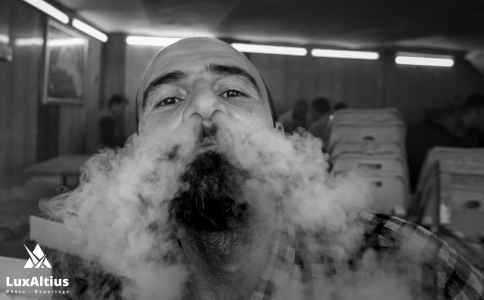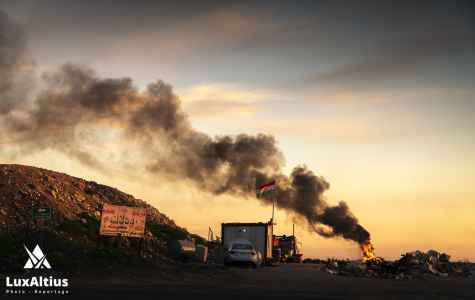Post Tenebras Lux - Notre Dame is burning, here comes Iraqi blaze

The 3rd chapter of my journey after a month in Iraqi Kurdistan.
Celebrating Newroz, Kurdish and Persian New Year, and roaming Erbil's old city.
[CLICK on the pictures to open slideshow.
Pour la version française, voir plus bas]
14 April 2019
Dear family and friends,
The crowd-funding exercise has been a real success and I’m really grateful to you all.
Many thanks. You will not be disappointed.
At present, after first and second episodes I’m writing to you from the city of Sulaymaniya. This is in the north-east of Iraq where I’ve been retained over the past three weeks by different journalistic opportunities which I hope to share in future communications. In the meantime, to better blend into the local scene, I’m letting my hair grow along with a beard.
I arrived in Iraqi Kurdistan, the evening of 20th March.
Coming from the Turkish side, along with my journalist friend Berivan, our transport proceeded eastward at breakneck speed along the closely-guarded frontier with Syria. A no-man’s land cut off by razor-wire, manned towers and tank obstacles. The horizon was dominated by pyres of thick black smoke as the Kurds of Mesopotamia, Kurdistan and Rojava burnt piles of rubber tyres around which they improvised dances on this, the eve of Newroz, the Kurd-Persian new year.
It took a couple of hours to accomplish the formalities for crossing the frontier into Iraq even if the Kurdish frontier guards were paying little attention to the dozens of cigarette cartons and other merchandise crammed into the normally empty spaces of the vehicle.
Once across, we were taken in charge by the Harki community, a local, well-connected family. We owed this favour to relations of Berivan whose name also signifies the ‘milkmaid’, a traditional figure of Kurdish resistance.
The Newroz euphoria starts on the hill of Aqra. It holds the attention of the Kurds for the entire evening as they march holding lighted torches, firing rifles into the air, setting off fireworks and dancing arm in arm. Subsequently the new-year festivities conclude with numerous picnics in the hills surrounding the city of Erbil, the principal city of the autonomous province of Kurdistan. Such activity is a favourite spring pastime before the arrival of hot, summer temperatures and, in keeping with traditions of local hospitality, we were exaggeratingly spoiled by our Harki hosts.
Proudly conscious of his nomadic origins in the neighbouring mountains of Turkey, our host led us to a great feast outside in open country. Our security was assured by a convoy of white leather-lined V8 Land Cruisers manned by young men armed with AK47 Kalashnikov rifles.
The traditional dances were performed to forceful vocal rhythms emanating from a single male singer. They consisted of relatively straightforward movements to and fro along with a jerking movement of the breast. All this was carried out amid an orgy of cooked meat accompanied by rice flavoured with grenadine syrup along with pastries. The evening ended next to a dying fire and the silhouettes of men wearing the jamadani, the local keffieh, set against the full moon.
The ritual over, Berivan took her leave from us to regain Turkey. I also thanked our generous hosts and returned to the city of Erbil over which there hung an odour of smoke like some sulphurous perfume. The atmosphere was infused however with a palpable joyfulness in which even old men took on an air of frivolity and renewed vigour. It was as if a sudden burst of gaiety was shaking off the weight of past ordeals. A kind of fools’ paradise of the ‘now’ in which amusement could supersede the holiest imaginings of the hereafter.
A stormy downpour with hail and torrential rain put an end to these devilish goings-on.
In the mud of waste-ground I stumbled on a camp of families squatting abandoned bunkers. They turned out to be Yezidis, from the region of Mosul, who had fled the horrors of Daesh. A taxi-driver described the tribulations inflicted by the jihadists before he’d escaped to the mountains. He and his family took me in late at night to a humble interior protected by breeze blocks and corrugated iron. Naked wires snaked their way to a neighbouring pylon from which light and pixels helped alleviate this forced precarity. Cuddled up against their father, in the fetid air of a petrol stove, fair-haired children slept, rocked by the lamentations of their elders.
Here, there is no escaping lamentation: the recent sufferings under Daesh; Sadam Hussein’s 1988 genocide of the Kurds in Anfal; the corruption of local officials.
But I hope to be presenting a contrasting and more optimistic image of Kurdistan in my next despatch.
With my recognition to you all.
Christopher
FRANCAIS: CLIQUEZ SUR LES PHOTOS pour ouvrir les diaporamas
Chers amis,
La campagne de crowdfunding fut un succès réel. Du fond du cœur, je vous en remercie.
Vous ne serez pas déçus.
Après les premier et deuxième épisodes, je vous écris de Sulaymaniya, au Nord-est de l’Iraq, où je me trouve depuis plus de trois semaines déjà. Des opportunités de reportages passionnants m’y maintiennent et je me réjouis d’en partager les trépidations dans de prochains mails. En attendant, je me laisse pousser barbe et cheveux afin d’en faciliter la réalisation.
Le Kurdistan irakien fut atteint dans la soirée du 20 mars. Et c’est à tombeau ouvert que mon amie journaliste Berivan et moi-même évoluâmes le long d’une frontière syrienne verrouillée. Palissade de barbelés, no man’s land, tourelles de meurtrières et tumulus destinés aux chars de combat. A l’horizon, d’épaisses fumées noires. On en perçut l’origine plus tard en Iraq. Les Kurdes de Mésopotamie, du Kurdistan et du Rojava, mettaient feu à des tas de pneus avant d’improviser des rondes tout autour. C’était veille du Newroz, le Nouvel An perse et kurde.
Il ne nous fallut que 2 heures pour passer les tracas administratifs de la frontière. Sciemment, les gardes-frontières kurdes furent peu regardants quant aux dizaines de cartouches de cigarettes et autres marchandises qui comblaient les espaces présupposés vacants du véhicule qui nous transportait. Sitôt le Kurdistan, nous fûmes pris en charge par la tribu des Harki, l’une des familles importantes alliée du pouvoir. Privilège qui nous vint des relations locales de Berivan dont le nom signifie « la laitière », figure traditionnelle de la résistante kurde.
L’euphorie du Newroz démarra sur la colline d’Aqra, laquelle capte le regard de tous les Kurdes en cette soirée. Processions de torches vives, tirs en l’air, feux d’artifice et farandoles bras dessus bras dessous. La nouvelle année fut ensuite consacrée par d’innombrables pique-niques dans les collines qui bordent Erbil, la capitale de la Province autonome du Kurdistan. C’est là l’un des passe-temps printaniers favoris, avant l’arrivée des fortes chaleurs. Suivant l’impeccable tradition de l’accueil en ces contrées, nous fûmes exagérément gâtés par les Harkis. Fière de ses origines nomades des montagnes du nord à cheval avec la Turquie, notre tribu-hôte nous conduisit à son festin en plein-air. Un convoi d’une trentaine de Land Cruisers V8 blanches et intérieur cuir fila dans la rase campagne, des gars arborant leur AK47 type Osama pour notre sécurité.
Les chorégraphies traditionnelles s’enchaînèrent sur les rythmes d’un chanteur vociférant. Chassés croisés, pas complexes et balancements du buste saccadés. Et ce dans une orgie de viandes, de riz au sirop de grenade et de pâtisseries. La soirée s’acheva au coin du feu, la silhouette des hommes portant le cemedanî, le keffieh local, se dessinant devant la pleine lune.
Sitôt le protocole honoré, Berivan la brave repartit pour la Turquie. J’abandonnai alors les ors et fastes de mes généreux hôtes pour le vieil Erbil. Il y régnait comme un parfum sulfureux dans une atmosphère enfumée et délétère. J’y découvris toutefois une fougue fabuleuse, l’allégresse des vieux hommes à l’œil facétieux et au geste gaillard. Comme un sursaut de gaieté pour compenser des épreuves souvent inavouables. Un sabbat de conneries étant préférable aux chimères de l’au-delà, si vierges et pures soient-elles.
Un déluge d’orages, de grêle et de pluies torrentielles mit fin aux diableries. Dans la boue d’un terrain vague, je finis par dénicher un camp de familles qui squattaient des casemates abandonnées. Il s’agit de Yézidis de la région de Mossoul qui avaient fui les horreurs de Daesh. Conducteur de taxi, le père de famille dut subir le chantage des jihadistes avant de s’enfuir pour les montagnes. Lui et sa famille me reçurent tard le soir, dans l’humble intérieur d’un appentis de parpaings et tôle arrangée. Quelques câbles dénudés pirataient le jus d’un pylône voisin pour accommoder de lumière et de pixels cette précarité forcée. Lovés contre leur père, dans l’irrespirable moiteur d’un poêle au pétrole, les gamins aux mèches blondes s’endormaient, bercés par la plainte des adultes.
Ici, on ne peut échapper aux lamentations. Doléances après Daesh, griefs remontant à l’Anfal -le génocide kurde ordonné par Saddam Hussein en 1988–, murmures contre la corruption et les pouvoirs. Mais j’espère vous dresser le portrait d’un Kurdistan plus contrasté et optimiste dans mon prochain mail.
Avec toute ma reconnaissance,
Christopher
























